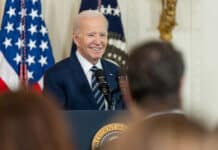
(The Center Square) — The federal government coordinated with an array of entities to censor Americans’ speech online, a newly released report from the Select Subcommittee on the Weaponization of the Federal Government shows.
In particular, the report shows that the Department of Homeland Security worked with Stanford and the Global Engagement Center, which works across agencies but sits under the State Department to create a streamlined process for identifying and censoring posts.
These groups formed the Election Integrity Partnership, which the report shows worked to censor and limit certain posts going into the 2020 presidential election. The report argues the federal government was “heavy handed” with universities and social media companies and censored conservative viewpoints far more often than liberal points of view under the guise of combating disinformation.
“Created in the summer of 2020 ‘at the request’ of the Cybersecurity and Infrastructure Security Agency (CISA), the EIP provided a way for the federal government to launder its censorship activities in hopes of bypassing both the First Amendment and public scrutiny,” the report said.
The report lays out how EIP analysts searched social media sites for undesirable content.
From the report:
“The EIP’s misinformation ‘analysts’ next scoured the internet for additional examples for censorship. If the submitted report flagged a Facebook post, for example, the EIP analysts searched for similar content on Twitter, YouTube, TikTok, Reddit, and other major social media platforms. Once all of the offending links were compiled, the EIP sent the most significant ones directly to Big Tech with specific recommendations on how the social media platforms should censor the posts, such as reducing the posts’ ‘discoverability,’ ‘suspending [an account’s] ability to continue tweeting for 12 hours,’ ‘monitoring if any of the tagged influencer accounts retweet’ a particular user, and, of course, removing thousands of Americans’ posts.”
This report is the latest in a series of reports, including the “Twitter Files,” which show the federal government pressured private and nonprofit organizations to quiet certain viewpoints.
Much of this push for censorship was fueled by concerns that former President Donald Trump was propelled to the White House by misleading news and content on social media sites.
U.S. House Speaker Mike Johnson, R-La., sparked headlines last month when he said that Twitter was an “FBI subsidiary” before billionaire Elon Musk took over. Johnson raised concerns again after this latest report.
U.S. Sen. Rand Paul, R-Ky., pointed to the report as well, pushing for his legislation, the Free Speech Protection Act.
Paul said that under this legislation, which he co-wrote with U.S. Rep. Jim Jordan, R-Ohio, the government “will be stripped of its ability to shroud its actions in secrecy and infringe upon the First Amendment rights of the American people.”
This latest report includes documents obtained from Standard that show examples of the censorship and the coordination between federal and private entities.
“The American people deserve to know if they were targeted by their own government and so-called ‘disinformation’ experts,” Jordan, who leads the weaponization committee, wrote on X.
















